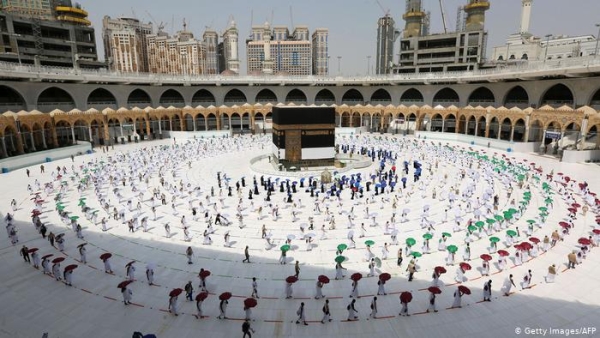The Nasrul-Lahi-l-Fatih Society of Nigeria has condemned the behaviour of some Nigerian Muslims performing the lesser hajj in Mecca, Saudi Arabia.
NASFAT urged Nigerian pilgrims to refrain from inappropriate and disrespectful conduct while in the holy city, stating that such actions did not represent Islam.
In viral videos circulating on X (formerly Twitter), some Nigerian Muslims were seen insulting other nationals in Yoruba while struggling to touch the Kaaba.
One Nigerian pilgrim in the video was heard telling a foreign national, “Are you the one who killed the Prophet, or perhaps your forefathers were responsible?”
Another pilgrim, mocking a white worshipper, said, “If you want to pray, pray and don’t disturb me here. You’ve started crying again…”
Additionally, many Nigerian pilgrims were seen recording and posting their spiritual activities on social media, a practice clerics have criticised as inappropriate.
Commenting on the matter, NASFAT’s National Da’wah Officer, Abdul-Ganiy Raji, expressed disappointment over the behaviour of the Nigerians, stating that pilgrimage should not be conducted in such a manner.
Raji called for consequences and penalties for misbehaving in the holy land, warning that acts of irreverence could render prayers ineffective.
“If one plays during solat, Allah won’t answer such a prayer. The irreligious acts by some Nigerians in Mecca are disturbing. People from across the world come for hajj and conduct themselves properly,” he said.
Raji alleged that individuals with questionable sources of wealth were often the ones engaging in misconduct, stressing that not all Nigerian pilgrims behaved in such a manner.
He also criticised the commercialisation of hajj, noting, “Hajj should not be seen as a profit-making venture.”
The NASFAT officer further blamed private hajj operators for failing to screen pilgrims properly before facilitating their trips.
“It is unfortunate that private organisations given slots by the National Hajj Commission do not screen those travelling for hajj. As a result, anyone with money—regardless of character—can go, even someone who is mentally unwell. NAHCON needs to address this issue.
“In the past, people who failed to answer basic religious questions were withdrawn from hajj, but that no longer happens,” he added.
Raji urged NAHCON to hold private operators accountable, suggesting that any company whose clients misbehaved should have its licence revoked.
Similarly, an Islamic cleric and lecturer at the Department of Religions, Lagos State University, Dr Sidiq Uthman, linked the behaviour of some Nigerian plgrims to excessive materialism.
He argued that many of the individuals involved might be unaware of the gravity of their actions and should not bear sole responsibility.
“Attention should be directed at the hajj agencies and coordinators responsible for supervising the pilgrims in Saudi Arabia. These individuals ought to have been warned of the implications of such sacrilegious acts,” Uthman said.
He also blamed social media for encouraging the inappropriate display of religious activities, pointing out that the problem was not limited to hajj pilgrims.
“This issue reflects the negative impact of social media in today’s world. Even here in Nigeria, places of worship have become selfie spots—ranging from Pentecostal churches to Muslim asalatu groups,” he noted.
Uthman further criticised some Muslim scholars, accusing them of promoting such behaviour by recording their own prayers to please sponsors.
“Religious leaders are equally guilty of this. Many record their secret prayers to prove to sponsors that they are fulfilling their obligations. When those who should lead by example engage in such acts, there is little hope for change,” he concluded.


